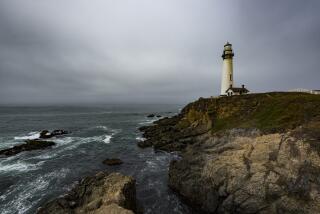The Other Gold Card--You Don’t Want In Without It
- Share via
I am back from four days at Mammoth Lakes with my older son, Curt, and his sons, Casey, 13, and Trevor, 9.
We stayed again in a rustic cabin at Alpers Owens River Ranch, at the head of the river. The altitude is 9,000 feet. I am not an Inca. I do not function well in thin air. That is probably why I lost two out of three Scrabble games I played with my grandsons.
I didn’t do too well on our outing last year, either, but I suspect that was because the boys kept playing words that didn’t exist. This time I brought a dictionary, and when Trevor proposed such words as vam or ploke I used its authority to disallow them.
The boys caught their limit of two fish each day (fishing in the ranch’s private stream). I didn’t fish. I don’t know how to fish. I don’t like to fish. Instead, I read three novels, which was a good vacation for me.
Curt did the cooking and the boys washed the dishes. I dodged both chores. Grandparental privilege. We had spaghetti two nights and went into town for dinner the other two nights. We froze the fish and took it home to my French daughter-in-law, Jackie.
Instead of coming home through Owens Valley we went over the top of the Sierra and down through Yosemite to Fresno. Counting lunch and pit stops it took us 12 hours to get home. But I had never seen Yosemite and my son thought I ought to. I agreed.
At the entrance to the park we stopped at a ranger post where a $5-per-car fee was being collected. I got out a $20 bill but a ranger looked in the car and said, “Keep your money. Any American 62 or older, there’s no charge.” He told me to stop at the visitors center up the road and get my gold card.
When we came to the center we stopped and I walked up to the structure and told a young woman behind a desk that I had come for my gold card. She asked to see my driver’s license, had me sign a register, then gave me a card that said “Golden Age Passport: A Lifetime Admission Permit.” I wasn’t so dumb to have waited so long to visit Yosemite. At least it had saved me $5.
The scenery, as almost every other Californian knows, is gorgeous. Lovely sudden lakes, giant trees, enormous towering granite peaks carved clean by glaciers. We were playing a tape of Joan Sutherland singing Verdi. Her voice seemed to soar as high as the mountains. There are many kinds of grandeur.
There were thousands of visitors who had arrived in thousands of cars and vans. The area around Yosemite Village, I was told, has a smog problem.
Almost without exception the vacationers were dressed in T-shirts and shorts--men, women and children. I saw one young woman in a pink dress standing by the road. She looked lost.
We passed under Bridalveil Fall, a huge granite precipice down which a lacy stream of water falls--not unlike a veil. Nearby we came upon the intimidating facade of El Capitan, a sheer granite wall that rises more than 3,000 feet straight up.
Through binoculars we could see a man, ant-like, climbing the wall, about one-third the way up. He was towing a large pack on a line--probably a sleeping bag. As I grow older I discover more and more things that I will never be able to do. I will never win a gold medal in the Olympics (not that I ever could have); and I will never scale El Capitan. Even if I had ever been able to, I don’t think I would have been crazy enough to try.
We stopped for lunch in the cathedral-like dining room of the Ahwahnee Hotel, beneath a towering granite dome.
We descended rapidly toward the San Joaquin Valley. With every mile my breath came easier. I had never been so happy to see Fresno.
Going south toward Bakersfield on 99 we passed loading sheds, silos and lush green fields of produce, vineyards and fruit trees--the breadbasket of the state. Every few miles we passed a town--Fowler, Selma, Kingsburg, Goshen, Tulare, Tipton, Pixley, Delano, Wasco, Shafter. Signs on the highway indicated that Delano has a McDonald’s and a Wendy’s, among other civilized establishments.
I guessed that most of those little towns had a high school, a football team and a marching band. My cousin Annabel grew up in Shafter and played trombone in her grade school band.
Considering the strains and stresses of growing up in the metropolis, there’s something to be said for small-town America. It’s still out there.
More to Read
Sign up for The Wild
We’ll help you find the best places to hike, bike and run, as well as the perfect silent spots for meditation and yoga.
You may occasionally receive promotional content from the Los Angeles Times.






